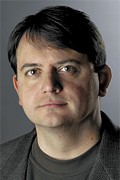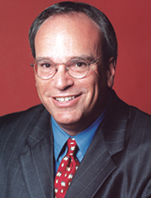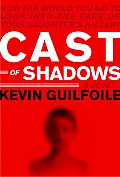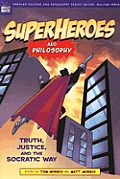Author2Author: Kevin Guilfoile & Tom Morris
Longtime readers may recall that I shared a college class with Kevin Guilfoile, the author of the quasi-futuristic thriller Cast of Shadows. When he and I were thinking about who we might convince to do an Author2Author with him, we turned to a former Notre Dame icon with whom both of us were familiar: former philosophy professor Tom Morris. Kevin actually got to study under Tom; I was routed into another class, but I heard about his guitar-wielding pedagogical technique all the same. Tom eventually left academia to work as a corporate advisor, but he still keeps his hand with the books—his most recent work is as the co-editor (with his son, Matt) of Superheroes and Philosophy, an anthology that combines insights from contemporary philosophers and comic book creators into the themes and concerns underlying some of today’s leading comics titles. Because Kevin’s novel is also a blend of pop culture tropes and philosophical reflection, the three of us figured there’d be plenty of interesting things to talk about…I hope you’ll agree.
 Kevin Guilfoile: In the terrific first essay of Superheroes and Philosophy, DC Comics’ Mark Waid describes the task of coming up with a more psychologically complex Superman for the 21st century, and his deliberations are fascinating. How was Superman affected by the knowledge that his home planet and his family had been destroyed? How was he influenced by the parenting style of Jonathan and Martha Kent? What about Kryptonian nature vs. human nurture? Maslow’s Hierarchy of Needs?
Kevin Guilfoile: In the terrific first essay of Superheroes and Philosophy, DC Comics’ Mark Waid describes the task of coming up with a more psychologically complex Superman for the 21st century, and his deliberations are fascinating. How was Superman affected by the knowledge that his home planet and his family had been destroyed? How was he influenced by the parenting style of Jonathan and Martha Kent? What about Kryptonian nature vs. human nurture? Maslow’s Hierarchy of Needs?
But isn’t there something of a conflict in these stories (in all modern stories, I think, but especially in comic book myths) between philosophy and psychology? Superman, after all, is a classic existential protagonist: It is not his extraordinary powers that make him a superhero, but his extraordinary choice–against great temptation–to use these powers for good. Hasn’t the example of Superman always been that the person we become is a choice? That, even though my subconscious substitutes food for affection, I refuse to eat that cupcake because the person I choose to be is two belt notches thinner? (The Kierkegaard Diet Plan! Eat that, Atkins!) If we replace free will with post-Freudian analysis, Superman becomes a more nuanced character, but is he still a real superhero to us?

Tom Morris: The question you raise is a fascinating one. Philosophy and psychology can sometimes pull in opposite directions. Of course, what we now call psychology was once just a part of what was broadly known as “moral philosophy”–a complete exploration of human nature and the human condition—as distinct from “natural philosophy,” which became physics, chemistry, biology and the various other “natural sciences. With the disciplines as they exist now, I think of psychology as a study into the functioning of the mind, as well as an investigation into the origins of human behavior, and I view philosophy as a more general pursuit of wisdom about the world, both theoretical and practical.
Superman has long been seen as a fairly one dimensional character. Despite his remarkable birth on another planet, and the dramatic details of how he got to earth to be raised by a farm family in Kansas, he has often been thought of as “plain vanilla,” “emotionally bland,” or “the Big Blue Boy Scout.” He just seems to be this completely altruistic individual who uses all his amazing power to save and defend others for no reward greater than the sense of an important job well done. That’s exciting to most kids, but unrealistic to many adults.
By contrast, so many of the other classic superheroes are clearly conflicted and psychologically complex characters. Most superhero stories begin with an accident or tragedy that changes the protagonist forever, launching him into a career of heroic acts in service to others. And it’s clear in many of the stories that these traumatic origins have complex psychological consequences (see Peter Parker/Spider-Man for a classic example).
Superman never saw his parents die or his home world destroyed. The tragedy of his origin story was always at a psychological remove from his adult memories, personality, and mindset. But Mark Waid was sure there was more to Superman than has been explored in the past. So he set out to plumb the depths of what it would mean to know that you’re an alien living on a foreign world, raised as one of us but not really one of us. What would his psychological needs be? How would they affect his choices to do good and serve as a superhero? Waid wanted to introduce more complexity into the character and, in our book, articulates for the first time exactly the philosophy and psychology behind the innovations in his recent and now famous graphic novel Superman: Birthright.
Many approaches to psychology over the past century-and-a-half have labored in a reductionist direction, describing and explaining human thought and behavior as nothing more than the products of various needs, urges, and reactions to external stimuli. In light of this, you pose an interesting challenge: Can Waid psychologize Superman without reducing his behavior to something other than the free choice that we see as necessary for true heroism? The notion of a hero is itself a moral or a normative category. The hero freely chooses right over wrong, for good reasons, and by the strength of his character overcomes any obstacles to that choice. But if the reductionist is right, heroes and superheroes are no different from the rest of us, in terms of moral praiseworthiness and stature, since we are all just the puppets of forces beyond our control.
I’m one of those philosophers who believes that we will never fully explain or explain away free will. I can’t imagine what would count as a decisive case against our normal ability to make free, unfettered, and unforced choices. Because of that, while I welcome the results of brain science, I have no fear of reductionism. The best neuroscience tells us what’s happening in the brain while we’re seemingly making our choices, but it never proves that those neural events preclude the reality of choices. Freudians and proponents of other schools of human behavior may note interesting correlations, and sometimes even causal mechanisms behind certain human behaviors, but I can’t imagine their ever making a compelling case that we are always compelled to act as we do.
I do see Waid as exploring both the psychology and the philosophy of Superman. He understands that, in line with Maslow’s famous account, we all have various needs. But he also suggests a philosophical point of view whereby meeting some of our own needs can be done only in the context of caring about something beyond ourselves. He explores the connection point between self-interest and altruism, not in such a way as to diminish Superman’s admirable concern for others, but to show how that relates to the normal psychological needs that Superman feels to develop and use his own distinctive talents in such a way as to provide the sort of personal fulfillment we’re all seeking in life. The Big Blue Boy Scout has a complex psychological life after all, and yet still by his choices shows us all the path to genuine heroism. Life doesn’t throw us a demand to choose between an utterly selfless life of service and a narrowly selfish self-fulfillment. With a proper philosophy of satisfaction, we can see that the only true fulfillment consists, in part, in belonging to a greater community and serving that community by developing and using our most distinctive talents for others as well as ourselves. The pleasant paradox is that, in serving others properly, we find that we have also served our own interests.
In Cast of Shadows, you vividly portray the dark side of human behavior. You show how both physical impulse and philosophical ideology can lead to violence. Here again, we have the distinction between psychology and philosophy, and an interplay between the two. One character has a philosophy of life centered on a particular theology that leads him to view certain human beings as objects to be eliminated. One or two other characters, and perhaps even more, have psychological impulses that drive them to treat certain other people as objects to be used or eliminated, as whim or frenzy might dictate. Did you mean to draw a parallelism between ideology and illness, or was this just a coincidence in the storytelling? Do you think of ideology as just another impulse, explainable wholly in psychological terms, or is there ever something more going on? Are you reminding us that there is danger in both our primal urges and in our seemingly higher artifacts of thought? Whatever your intentions, the results are strikingly effective in their impact on a reader.
 Kevin Guilfoile: I love it when I’m talking with someone about Cast of Shadows and they’re able to describe its themes in ways I haven’t considered. Thanks to readers who are smarter than me, I’m still learning from this book all the time.
Kevin Guilfoile: I love it when I’m talking with someone about Cast of Shadows and they’re able to describe its themes in ways I haven’t considered. Thanks to readers who are smarter than me, I’m still learning from this book all the time.
The first character you mention, Mickey “The Gerund” Fanning, is a radical Christian fundamentalist who believes he carries out God’s plan by assassinating professionals in the human cloning industry. Once Mickey decided to follow this particular ideology, he found his choices were all made for him. If you can imagine a decision tree, Mickey’s beliefs tell him how to act in every instance. And what separates him from others who share his beliefs is his willingness to follow those branches to the very end, where they finally instruct him to kill. In the face of what he believes to be Truth and Righteousness, Mickey denies even God the ability to make choices. Although he believes he is carrying out God’s will by committing murder, Mickey recognizes that killing is a sin and that God must punish him for it. In a sort of mirror of the Grand Inquisitor, Mickey sees himself as a true martyr, one not just willing to die for God, but to suffer in hell for Him.
As you suggest, Justin, the cloned child, is twisted by complex psychological forces. When he discovers that he is a clone (and more specifically, begins to suspect from whom he was cloned) his own beliefs about the world radicalize him. In contrast to Mickey, however, Justin’s ideology is determinism. Justin believes that “a hurricane has more choices than man,” and that, having been cloned from a murderer, his own fate is sealed and he speeds down that path. The reader is left to decide if Justin’s fate really is predetermined, or if he chose that fate because he believes so completely in his own destiny.
Davis Moore, the doctor who has cloned his daughter’s murderer, is horrified by the consequences of that decision and tries to abdicate responsibility for them by refusing to make almost any choices at all for much of the book. This makes him easily manipulated by others, especially Justin. It is only when a character makes a free and difficult choice at the story’s end (albeit a choice with its own potential consequences) that Davis is saved from the cycle of tragedy and violence that he set in motion.
If you think of the exercise of free will as being “healthy,” which I do, and that (as in Mickey’s case) strict adherence to an ideology can interfere with your ability to choose freely, then I guess the book is framing ideological extremism as a disease in that context. I want to be careful, however. At least one reader I know has said Cast of Shadows is “anti-religion,” which I would argue is a complete misreading. For me, faith is an essential tool in the ongoing search for truth. When we make choices based on what we believe is right or wrong we are testing and fine-tuning our beliefs. What I find troubling is when people embrace an ideology (whether it is religious or political or philosophical) as an end in itself. When they are so certain of the truth, so beyond doubt, that they surrender their responsibility for choosing what is right and what is wrong.
Superheroes and Philosophy has several terrific pieces on identity, including your closing essay, “What’s Behind the Mask? The Secret of Secret Identities.” When an individual decides to leverage his uber-abilities into a career as a crimefighter, it’s often necessary to create a secret, civilian identity to protect his family and loved ones (and the morality of this is explored by several of your contributors). But, of course, that secret is also a weakness that can be exploited by his enemies. Could you elaborate a bit more on the “secret” half of “secret identities.” In what ways do secrets, even ones we initially keep in order to acquire or protect power and influence, paradoxically also make us vulnerable?

Tom Morris: To me, one of the most interesting things about secret identities is that they’re a two way street. When Superman is flying around Metropolis saving people, no one knows that he’s secretly Clark Kent. When our alien Son of Krypton is working at the Daily Planet as reporter Clark Kent, no one suspects his secret that he’s really Superman. In each role, the other life is the secret identity. But an interesting question is whether there is underneath this balanced duality a final fundamental asymmetry, a basic real identity and an alternative secret one, all things considered? That’s a tough question.
Because of a tragic accident, Matt Murdock was both blinded and given super-powers. When his father was later killed by mobsters, he assumed the secret identity of Daredevil to fight crime and corruption on the streets—when he’s not in the courtroom serving justice in another way, often as a defense lawyer. He is a bundle of contradictions, a blind yet radar-enhanced superhero, an officer of the court who pursues bad guys as a vigilante, a good Catholic boy who loves beating up on street thugs. In each of these roles, the other is a secret.
Some of the superheroes don’t have secret identities—for example, the members of the Fantastic Four and the X-Men—but most do, and these identities are always more than a matter of costuming. We see Bruce Wayne initially dressing as Batman, but over time gradually being transformed into that crime-fighting character. Ultimately, as the new film Batman Begins acknowledges, it’s the wealthy-Bruce-Wayne-corporate-titan persona that acts as a mask and keeps people from knowing that this individual is really Batman, scourge of all criminals. The socialite business identity allows Batman to move in circles of power and influence and gain the information he needs for his chief mission. We see the sensibilities of the man behind the mask begin to conform over time to the mask itself.
In many superhero stories, the secret life of costumed vigilante begins to affect and alter the fundamental personality characteristics of the civilian with powers. And this is of general human interest. We all wear various masks as we play different roles in our lives. Many of my neighbors who see me walking on the beach in an old T-shirt and wrinkled khakis would never guess my other life as a philosophical public speaker to the corporate world. Likewise, the 3,200 people who see me this weekend philosophizing from the stage at 100 miles an hour in San Diego might not recognize the beach boy at all. I’ve had to work hard not to let the pace and pressures of my public life distort the flow and peacefulness of my personal existence and family life. And I’ve often needed family members to tell me when they see an unwanted transformation happening. Both Alfred the Butler and Batman’s friends in the Justice League often serve the same role for him and, I think, insist on calling him “Bruce,” even when he’s at work as the Bat, as if to call him back to who he once was and should continue deep down to be.
Secrets can be dangerous then in more than one way. The superheroes’ secrets protect their private lives, and guard their loved ones from the reprisals of enemies. Everyday secrets often play a similar role in all our lives, protecting parts of our personal existence, or guarding our friends and family members from disruptive things we wouldn’t want to enter their lives. So, if we work in public, we may have an unlisted phone number, or an unpublished address. But secrecy is inherently risky. Anything that depends on a secret is fragile. It’s just hard to keep secrets. And other people often resent anyone’s success in the endeavor. Worse, most forms of secrecy are in the end forms of deception, and so constitute ethical thin ice. I’ve come to believe that deception is always morally dangerous outside the most extreme demands of life or death situations, and perhaps even there, though in such circumstances, deception is usually judged preferable to death.
I believe that, in principle, truth is always better than falsehood, authenticity than illusion. The business world provides a great confirmation of this. Executives at Enron used secrets to achieve their ends. And we see what happened as a result. Yet undercover cops and CIA operatives, like superheroes, normally can’t operate without them. So it interests me as a philosopher to observe the secret identities played out in the lives of the superheroes, both for what it teaches me about human nature and the demands of ethics.
I’ve come to think that Cast of Shadows is an ideal example of a certain way of doing philosophy. It’s an exciting page turner, with surprises and interesting plot twists galore, but it also has a deeper texture. It’s much more substantive than many other very good thrillers out there, and it attains its depth without losing any of its surface excitement. It’s really chock full of philosophical ideas, without being in the least pedantic. But of course, as the philosopher Wittgenstein discovered, some things are better shown than said. How did you become such an astute philosopher? And have you experienced any tension between the philosophical side of your own thinking and the demands of writing a good novel? Do these otherwise diverse sensibilities ever conflict or do they feed each other? I’ve been told that Bertrand Russell once sat down to write a poem, put on paper the word, “Whereas,” stared at it a very long time, deep in thought, and then just gave up.
Kevin Guilfoile: Thanks so much for the kind words, Tom. Unlike Justin in Cast of Shadows (a philosopher practically out of the womb), I suppose I first became interested in philosophy reading Woody Allen stories in high school. I started looking up guys like Wittgenstein only so I could get the jokes. There’s no question that my experience at Notre Dame was a tremendous influence, beginning with your intro class freshman year (which I don’t think I ever missed, by the way, despite the fact that it met Mondays at 8 AM). There were a lot of professors in that department, you foremost among them, who went to great lengths to make philosophy relevant, which is a difficult task considering the abbreviated menu of things 18-year-olds consider important. I remember a class where we read Dostoevsky and Camus, but we also watched Robocop and Blade Runner and Godard’s Breathless and we wrote papers about the Silver Surfer (a character Superheroes and Philosophy revisits, to my delight). The idea that philosophy wasn’t an archeological dig but that these enduring questions were still vitally important (and were ones I came in contact with every day) was a revelation to me. I took every philosophy class I could fit into my schedule and today I look at everything–politics, art, science, entertainment, friendship—through the philosophical lenses you and others made for me in college.
So it’s natural that my writing passes through that prism as well. The challenge as a novelist, I think, is to identify the places where the story intersects with these ideas and to weld those parts deftly, so it doesn’t feel like you are manipulating one to get to the other.
I’ve had a terrific time meeting readers at signings and at book club meetings. At most of these gatherings I ask which character they think is the hero of the book and I think I’ve received, to this point, four different and intelligent answers (I have my own opinion, by the way, but it’s only an opinion). What I’ve found is that people who read Cast of Shadows as a thriller have one idea, people who read it as a mystery have another, people who think it’s a scientific cautionary tale have another, and folks who read it on a philosophical level have yet another. I read so many books in which you’re told from the start whom to root for and in the end your support is rewarded when every decision made by that character is completely redeemed. It’s like getting a tip on a fixed horse race. I didn’t want to tell people how to think or how to feel about the characters or the story; I wanted the reader to have to make those decisions for herself. At every stage of writing and editing the novel, I was told that this was risky, and to have so many readers tell me that they like the book precisely because it asks them to think for themselves has been the most gratifying thing.
8 July 2005 | author2author |

 Our Endless and Proper Work is my new book with Belt Publishing about starting (and sticking to) a productive writing practice.
Our Endless and Proper Work is my new book with Belt Publishing about starting (and sticking to) a productive writing practice. 
